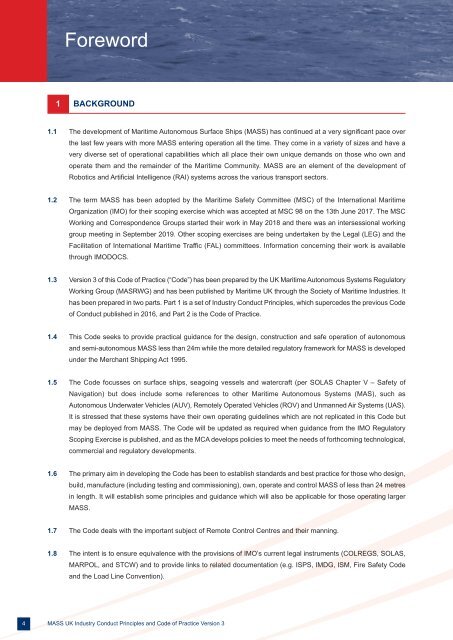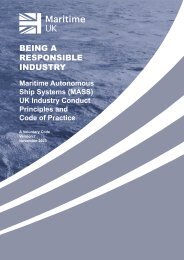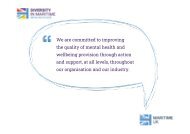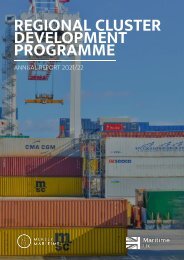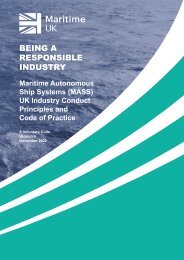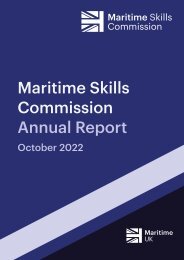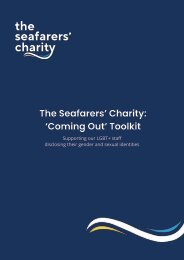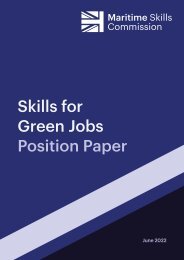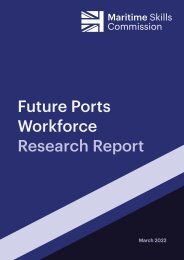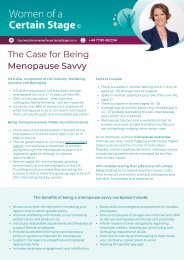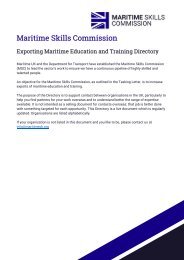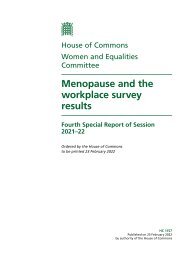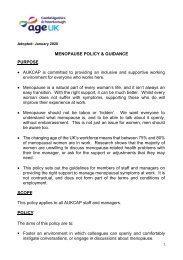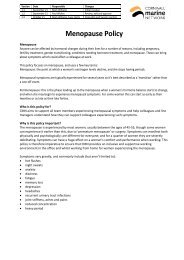code_of_practice_V3_2019
You also want an ePaper? Increase the reach of your titles
YUMPU automatically turns print PDFs into web optimized ePapers that Google loves.
Foreword<br />
1 BACKGROUND<br />
1.1 The development <strong>of</strong> Maritime Autonomous Surface Ships (MASS) has continued at a very significant pace over<br />
the last few years with more MASS entering operation all the time. They come in a variety <strong>of</strong> sizes and have a<br />
very diverse set <strong>of</strong> operational capabilities which all place their own unique demands on those who own and<br />
operate them and the remainder <strong>of</strong> the Maritime Community. MASS are an element <strong>of</strong> the development <strong>of</strong><br />
Robotics and Artificial Intelligence (RAI) systems across the various transport sectors.<br />
1.2 The term MASS has been adopted by the Maritime Safety Committee (MSC) <strong>of</strong> the International Maritime<br />
Organization (IMO) for their scoping exercise which was accepted at MSC 98 on the 13th June 2017. The MSC<br />
Working and Correspondence Groups started their work in May 2018 and there was an intersessional working<br />
group meeting in September <strong>2019</strong>. Other scoping exercises are being undertaken by the Legal (LEG) and the<br />
Facilitation <strong>of</strong> International Maritime Traffic (FAL) committees. Information concerning their work is available<br />
through IMODOCS.<br />
1.3 Version 3 <strong>of</strong> this Code <strong>of</strong> Practice (“Code”) has been prepared by the UK Maritime Autonomous Systems Regulatory<br />
Working Group (MASRWG) and has been published by Maritime UK through the Society <strong>of</strong> Maritime Industries. It<br />
has been prepared in two parts. Part 1 is a set <strong>of</strong> Industry Conduct Principles, which supercedes the previous Code<br />
<strong>of</strong> Conduct published in 2016, and Part 2 is the Code <strong>of</strong> Practice.<br />
1.4 This Code seeks to provide practical guidance for the design, construction and safe operation <strong>of</strong> autonomous<br />
and semi-autonomous MASS less than 24m while the more detailed regulatory framework for MASS is developed<br />
under the Merchant Shipping Act 1995.<br />
1.5 The Code focusses on surface ships, seagoing vessels and watercraft (per SOLAS Chapter V – Safety <strong>of</strong><br />
Navigation) but does include some references to other Maritime Autonomous Systems (MAS), such as<br />
Autonomous Underwater Vehicles (AUV), Remotely Operated Vehicles (ROV) and Unmanned Air Systems (UAS).<br />
It is stressed that these systems have their own operating guidelines which are not replicated in this Code but<br />
may be deployed from MASS. The Code will be updated as required when guidance from the IMO Regulatory<br />
Scoping Exercise is published, and as the MCA develops policies to meet the needs <strong>of</strong> forthcoming technological,<br />
commercial and regulatory developments.<br />
1.6 The primary aim in developing the Code has been to establish standards and best <strong>practice</strong> for those who design,<br />
build, manufacture (including testing and commissioning), own, operate and control MASS <strong>of</strong> less than 24 metres<br />
in length. It will establish some principles and guidance which will also be applicable for those operating larger<br />
MASS.<br />
1.7 The Code deals with the important subject <strong>of</strong> Remote Control Centres and their manning.<br />
1.8 The intent is to ensure equivalence with the provisions <strong>of</strong> IMO’s current legal instruments (COLREGS, SOLAS,<br />
MARPOL, and STCW) and to provide links to related documentation (e.g. ISPS, IMDG, ISM, Fire Safety Code<br />
and the Load Line Convention).<br />
4<br />
MASS UK Industry Conduct Principles and Code <strong>of</strong> Practice Version 3


